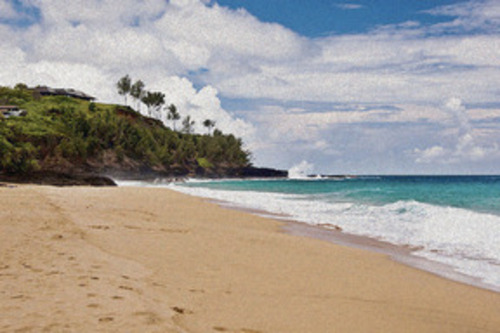Development blocks traditional access

Photo courtesy Kenny Wolf Residents want beach access restored at Kauapea Beach, Kauai.
Linda Sproat said her ancestors were chiefs in charge of fishing at Kauapea Beach and other North Kauai areas, using a trail to get to the ocean.

That trail is now blocked by a landowner.
"That was the only way we could get down there," said Sproat, 71, who wants the trail reopened. "I think it’s awful. … It’s a traditional access that we’ve had over the years."
As land developments increase in Hawaii’s once rural areas, some residents are becoming increasingly worried about the loss of access to recreational, hunting and fishing areas.
In a number of instances, people have used trails owned passively for years by private landowners but now blocked because of residential or hotel developments. Other trails have existed since 1892 or earlier, belonging to the Hawaii government, and are recognized as traditional and customary.
Don't miss out on what's happening!
Stay in touch with breaking news, as it happens, conveniently in your email inbox. It's FREE!
But advocates have sometimes found problems proving the trails are traditional.
The state and counties have also been reluctant to assume responsibility for trails that might cause lawsuits.
Trails advocate Debbie Chang isn’t optimistic about the state or county becoming a strong advocate for public trail access in a tight economy.
"With today’s fiscal situation it’s going to be even a more low priority," Chang said.
"It’s not getting easier. It’s getting harder."
Some trail advocates are fighting not only landowners, but also state and counties, which are supposed to enforce beach access laws.
At the Hokulia resort development in South Kona, trail advocates sued the private landowner and state, with assistance from the Native Hawaiian Legal Corp., to restore access to a coastal trail.
Though Circuit Judge Ronald Ibarra ordered the Hokulia developer in 2002 to restore the trail, public access advocates said they’re still waiting for the developer to transfer an easement that allows the public to use a parking lot and walkway to hike to the trail.
On Maui the nonprofit group Public Access Trails Hawaii has filed legal action to get the state and Haleakala Ranch to reopen a 3.3-mile trail formerly used by hikers and horse riders to access the summit of Haleakala through the mid-1930s, when a separate highway was built to the summit.
The group wants the courts to assume jurisdiction over the trail and declare it is an ancient trail that provided traditional and customary access to people.
The state and ranch have declined comment.
On Kauai an investment hui was required to maintain the beach access from a public road to the shoreline at Kauapea Beach as part of receiving its special management area permit in 1977.
But when developer Ben Garfinkel obtained a land use change, the public easement wasn’t included in the county Planning Commission conditions in 1999.
Garfinkel, reached by cellphone, declined to comment on why the easement was not provided.
In a 1999 report, the county Planning Department said a traditional access exists on a portion of Garfinkel’s property.
"The fact that this access was not formalized did not cause this traditional access to disappear," the department said.
County Planning Director Michael Dahilig said his department is researching the ownership of the trail.
Sproat said she recalled the trail being used by her father and grandfather. They walked it down to the beach to catch fish and organize a hukilau, sharing the bounty with those who helped to pull in the nets.
She said the lack of access is awful for the Hawaiian culture.
"We cannot practice our customs and use our traditional access," she said.



